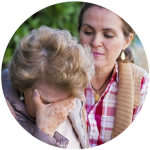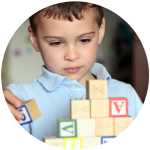Clinical Services
If you or a loved-one is concerned about any changes in cognition or in behavior, we offer consultation services. We can develop a comprehensive, individualized treatment plan. We give detailed feedback to each patient. If the patient wishes, we can schedule meetings with family members and/or caregivers. We can communicate our recommendations to a healthcare provider. We can offer advice to families and caregivers in how to care for their loved ones over time. We can provide end-of-life support.

Our main focus is to provide services for adults with cognitive and behavioral complaints/disorders. If you do have an older child or adolescent with changes in cognition or in behavior, we may be able to offer consultation services.
Our healthcare team has experience in academic, public and private healthcare settings. In addition to providing clinical consultations and treatment recommendations, we conduct scholarly activities to advance the science of brain health.
We provide consultation services, and will develop individualized treatment plans for a number of medical conditions including:
Cognitive & Behavioral Complaints
 A complaint is a ‘symptom’ that an individual feels is problematic because the ‘symptom’ is interfering with daily life. One of the most common presenting complaints or ‘symptoms’ in an older adult is difficulty with memory. Memory is defined as your ability to learn new information or to recall past knowledge, feelings or skills. With increasing age, many people feel that it is more difficult to remember things. For example, you may find it more difficult to remember explicit details of what you read in the paper two days ago. You may have more difficulty remembering names of people that you met last week. You may find that you are frequently misplacing your keys. When are these ‘symptoms’ clinically significant? Will these ‘symptoms’ inevitably lead to a diagnosis of Alzheimer’s dementia? Can my symptoms be treated so that I can regain function or change my behavior? Is there anything that can be done to prevent dementia?
A complaint is a ‘symptom’ that an individual feels is problematic because the ‘symptom’ is interfering with daily life. One of the most common presenting complaints or ‘symptoms’ in an older adult is difficulty with memory. Memory is defined as your ability to learn new information or to recall past knowledge, feelings or skills. With increasing age, many people feel that it is more difficult to remember things. For example, you may find it more difficult to remember explicit details of what you read in the paper two days ago. You may have more difficulty remembering names of people that you met last week. You may find that you are frequently misplacing your keys. When are these ‘symptoms’ clinically significant? Will these ‘symptoms’ inevitably lead to a diagnosis of Alzheimer’s dementia? Can my symptoms be treated so that I can regain function or change my behavior? Is there anything that can be done to prevent dementia?
Some cognitive and behavioral symptoms include:
- A change in the ability to remember or recall information
- Difficulty coming up with the correct word during a conversation
- Difficulty with attention or concentration
- Difficulty making a cup of coffee
- Increased problems with finding objects around the house
- Difficulty finding a location on a map
- Difficulty with interpersonal relationships such as a change in mood or personality
Age-Related Cognitive & Behavioral Disorders
 Age-related cognitive disorders are scientifically based clinical syndromes associated with changes in the brain that lead to changes in behavior. These clinical syndromes usually progress slowly over many years and lead to significant problems in daily-life situations. For example, a patient with an age-related cognitive disorder may no longer be able to pay their bills or make a cup-of-coffee. In contrast to the more slowly evolving degenerative dementias, like Alzheimer’s disease, some disorders are associated with a more abrupt change in cognition or behavior. These include stroke or traumatic brain injury following a motor vehicle accident or a major concussion from a contact sports injury.
Age-related cognitive disorders are scientifically based clinical syndromes associated with changes in the brain that lead to changes in behavior. These clinical syndromes usually progress slowly over many years and lead to significant problems in daily-life situations. For example, a patient with an age-related cognitive disorder may no longer be able to pay their bills or make a cup-of-coffee. In contrast to the more slowly evolving degenerative dementias, like Alzheimer’s disease, some disorders are associated with a more abrupt change in cognition or behavior. These include stroke or traumatic brain injury following a motor vehicle accident or a major concussion from a contact sports injury.
Some, but not all, adult onset cognitive-behavioral disorders include:
- Alzheimer’s disease
- Frontotemporal dementia syndromes
- Lewy Body dementia
- Mild cognitive impairment
- Parkinson’s disease dementia
- Post-stroke disorders including vascular dementia and vascular cognitive impairment
- Sleep-related cognitive and behavioral disorders
- Traumatic brain injury and concussion related cognitive and behavioral disorders
Developmental Cognitive & Behavioral Disorders
 Healthy brain development depends on a complex interplay of many factors. Brain development occurs rapidly in the first two years of life with the expansion of brain size. This period of rapid brain growth corresponds to the acquisition of skills such as reaching and grasping, speaking, gesturing, and walking.
Healthy brain development depends on a complex interplay of many factors. Brain development occurs rapidly in the first two years of life with the expansion of brain size. This period of rapid brain growth corresponds to the acquisition of skills such as reaching and grasping, speaking, gesturing, and walking.
The brain continues to enlarge in early childhood with this period of brain growth associated with the development of white matter brain connections. Complex cognitive and behavioral functions like reading a book, riding a bike, or drawing a picture develop during this time.
In general, cognitive and behavioral disorders in early childhood are recognized when a child does not achieve a typical developmental milestone at the right age, or when a child has a change in function. An example would be language delay, defined as a child not speaking until age four. The trajectory of early childhood development differs from the average acquisition of specific milestones in children with a diagnosis of a developmental disorder. There is ongoing research into what brain mechanisms are associated with the onset of developmental disorders. Nevertheless, it is well known that atypical development of cognitive and behavioral functions is associated with differences in how brain networks develop and function.
Developmental Disorders (syndromes) include, but are not limited to the following:
- Autism spectrum disorder (ASD)
- Attention deficit hyperactivity disorder (ADHD)
- Developmental dyslexia
- Developmental stuttering
- Speech apraxia
Each of these syndromes has a constellation of behavioral deficits and cognitive symptoms that define the disorder. A common feature is that these syndromes begin in early childhood. Parents may first notice problems, when their child enrolls in an early childhood education program. Over time, teachers, family members, and healthcare professionals may observe differences compared to children who do not have a developmental disorder.
A specific ‘symptom,’ like stuttering, can be very mild or may be severe and debilitating. These symptoms and the related developmental disorders are defined along a continuum of disease severity. Some children may show remarkable improvement; medical, cognitive and behavioral therapy can help. Other children may have persistent problems throughout life, including the occurrence of new distressing behaviors or regression of a previously acquired skill. As other chronic medical conditions, like hypertension or diabetes, and new problems develop, there may be further changes in the brain and behavior with advancing age.
How do we identify cognitive and behavioral disorders?
The major tools we use to identify cognitive and behavioral disorders include: a medical history and comprehensive medical examination. Diagnostic studies, like blood work or brain imaging, may be necessary and can improve diagnostic accuracy. Individualized treatment plans are developed based on the information gathered from the medical history and medical examination in conjunction with the interpretation of diagnostic studies.
Very few places offer specialized consultation services for adults with developmental disorders or evaluate worsening symptoms with increasing age. Contact us today to schedule a clinical analysis, review the results and discuss your options.
